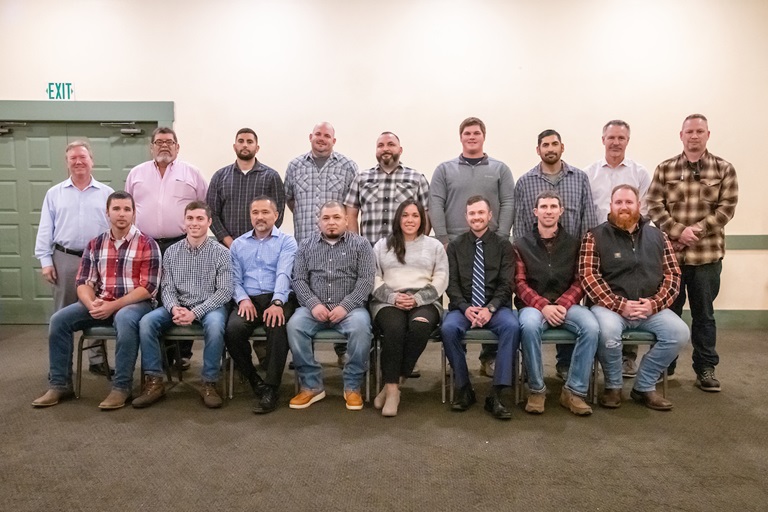DWR Honors Apprenticeship Program’s Newest Graduates
DWR’s 2019 Apprenticeship Program graduates. Adam Blank (front row, first from the right) and Oscar Pulido (back row, fifth from the right) shared their experiences going through the program. (DWR/2019)
Eighteen apprentices are well on their way to jumpstarting their professional careers after completing the Department of Water Resources’ (DWR) Apprenticeship Program.
A graduation luncheon held in December in Bakersfield celebrated the 2019 graduating class for their success in completing their training and journeyperson certification.
DWR's paid apprenticeship program prepares individuals for a career in the hydroelectric industry by combining hands-on-learning, classroom study, and home study with supervised on-the-job training. Apprenticeships last for three-to-four years at DWR’s five Field Divisions and two Flood yards, and are offered for Utility Craftworkers, Hydroelectric Plant (HEP) Operators, HEP Mechanics, and HEP Electricians
“I think the program did an amazing job at preparing me for this career. Not only was the classroom instruction great, but the time working with journey level electricians in the field was also immensely valuable,” said Oscar Pulido, one of the program’s newest graduates.
Pulido - who said he has always held an interest in the electrical field - joined the apprenticeship program in December 2015 as a HEP Electrical Apprentice.
“I came into the program with very little knowledge of electrical theory or anything having to do with hydroelectrical power. This program is set up in such a way that anyone willing to put in some effort can thrive and learn,” Pulido said. “I have learned and received training for everything I will deal with in these pumping and generating plants, including maintenance and new construction.”
Pulido now works as a Hydroelectric Plant Electrician for DWR’s San Joaquin Field Division where he maintains and troubleshoots the equipment in State Water Project (SWP) pumping and generating plants.
As part of the program, apprentices are given practical exam projects to complete every six months that increase in difficulty as they progress, and can earn college credits in Industrial Technology by completing courses that vary by trade. Upon completion of the program, apprentices are guaranteed a full-time journey-level position with DWR in their field.
Adam Blank, also a 2019 graduate of the apprenticeship program who now works for DWR’s Sutter Maintenance Yard, attended courses that covered a variety of subjects from basic electricity, heavy equipment, and hydraulics to welding, flood fighting, and mathematics. It was classes like these that helped Blank become a certified welder in addition to his Utility Craftsworker training.
“I would say that welding was the most beneficial thing I’ve learned from the Training Center side of the program. I have always dabbled a little in welding and this program taught me from the very beginning how and why welding works the way it does,” Blank said. “You truly get an opportunity to dabble in a variety of different fields that prepare you for the future.”
Blank joined the program in December 2016 after reading up on the apprenticeships offered by DWR and speaking with former apprentices to satisfy a long-held curiosity.
“Because I’ve lived in Sutter my whole life, I always passed by the Sutter Maintenance Yard and wondered what it was and what people did there. So, I did my research, studied, and decided to apply for the Utility Craftsworker Apprenticeship,” Blank said. “It’s exciting to me that my journey has just begun and the way I feel is the way I would want other people to feel when they discover their career!”
Now working as a Utility Craftsworker at Sutter Maintenance Yard, Blank conducts routine maintenance work removing debris from channels, preparing for potential water increases, and managing flows to prevent potential flood events.
To qualify for the apprenticeship program, applicants must be at least 18 years old, have a high school diploma or educational equivalent, and successfully pass DWR’s apprenticeship exam, which is given in the spring of each year. Upon passing the written exam, applicants are eligible to apply for the apprenticeship program.
“My advice to new apprentices going through the program would be to ask questions. Everyone from your peers to the trainers want to see you succeed,” Blank said. “The program creates an environment that is both positive and encouraging – no one wants to see you fail.”
For those interested in launching their own career in the hydroelectric industry, the apprenticeship examination process begins April 2020. More details will be provided on DWR’s website in the coming months.
